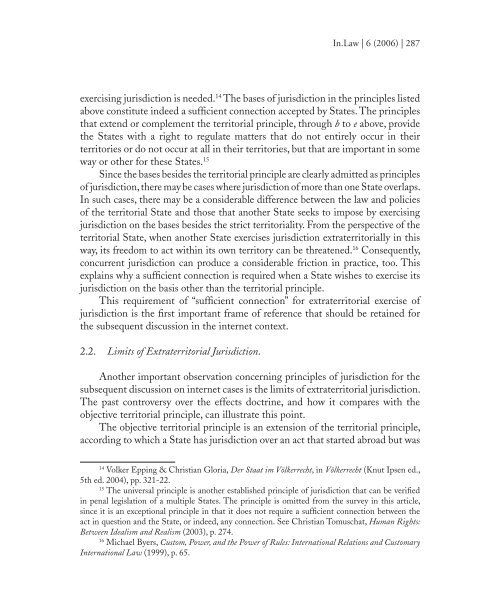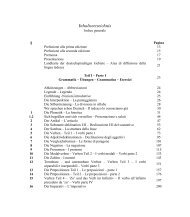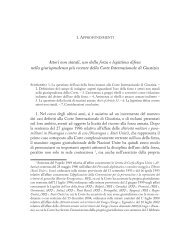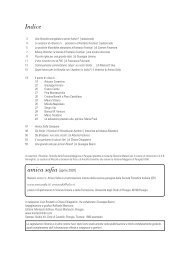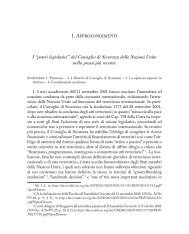Objective Territorial Principle or Effects Doctrine? Jurisdiction and ...
Objective Territorial Principle or Effects Doctrine? Jurisdiction and ...
Objective Territorial Principle or Effects Doctrine? Jurisdiction and ...
Create successful ePaper yourself
Turn your PDF publications into a flip-book with our unique Google optimized e-Paper software.
In.Law | 6 (2006) | 287<br />
exercising jurisdiction is needed. 14 The bases of jurisdiction in the principles listed<br />
above constitute indeed a sufficient connection accepted by States. The principles<br />
that extend <strong>or</strong> complement the territ<strong>or</strong>ial principle, through b to e above, provide<br />
the States with a right to regulate matters that do not entirely occur in their<br />
territ<strong>or</strong>ies <strong>or</strong> do not occur at all in their territ<strong>or</strong>ies, but that are imp<strong>or</strong>tant in some<br />
way <strong>or</strong> other f<strong>or</strong> these States. 15<br />
Since the bases besides the territ<strong>or</strong>ial principle are clearly admitted as principles<br />
of jurisdiction, there may be cases where jurisdiction of m<strong>or</strong>e than one State overlaps.<br />
In such cases, there may be a considerable difference between the law <strong>and</strong> policies<br />
of the territ<strong>or</strong>ial State <strong>and</strong> those that another State seeks to impose by exercising<br />
jurisdiction on the bases besides the strict territ<strong>or</strong>iality. From the perspective of the<br />
territ<strong>or</strong>ial State, when another State exercises jurisdiction extraterrit<strong>or</strong>ially in this<br />
way, its freedom to act within its own territ<strong>or</strong>y can be threatened. 16 Consequently,<br />
concurrent jurisdiction can produce a considerable friction in practice, too. This<br />
explains why a sufficient connection is required when a State wishes to exercise its<br />
jurisdiction on the basis other than the territ<strong>or</strong>ial principle.<br />
This requirement of “sufficient connection” f<strong>or</strong> extraterrit<strong>or</strong>ial exercise of<br />
jurisdiction is the first imp<strong>or</strong>tant frame of reference that should be retained f<strong>or</strong><br />
the subsequent discussion in the internet context.<br />
2.2. Limits of Extraterrit<strong>or</strong>ial <strong>Jurisdiction</strong>.<br />
Another imp<strong>or</strong>tant observation concerning principles of jurisdiction f<strong>or</strong> the<br />
subsequent discussion on internet cases is the limits of extraterrit<strong>or</strong>ial jurisdiction.<br />
The past controversy over the effects doctrine, <strong>and</strong> how it compares with the<br />
objective territ<strong>or</strong>ial principle, can illustrate this point.<br />
The objective territ<strong>or</strong>ial principle is an extension of the territ<strong>or</strong>ial principle,<br />
acc<strong>or</strong>ding to which a State has jurisdiction over an act that started abroad but was<br />
14 Volker Epping & Christian Gl<strong>or</strong>ia, Der Staat im Völkerrecht, in Völkerrecht (Knut Ipsen ed.,<br />
5th ed. 2004), pp. 321-22.<br />
15 The universal principle is another established principle of jurisdiction that can be verified<br />
in penal legislation of a multiple States. The principle is omitted from the survey in this article,<br />
since it is an exceptional principle in that it does not require a sufficient connection between the<br />
act in question <strong>and</strong> the State, <strong>or</strong> indeed, any connection. See Christian Tomuschat, Human Rights:<br />
Between Idealism <strong>and</strong> Realism (2003), p. 274.<br />
16 Michael Byers, Custom, Power, <strong>and</strong> the Power of Rules: International Relations <strong>and</strong> Customary<br />
International Law (1999), p. 65.


